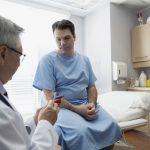Laparoscopy
What is a laparoscopy?
A laparoscopy is a type of keyhole surgery used to inspect and operate on the organs inside the abdominal (belly) and pelvic area. Laparoscopy can be used for diagnosis, by viewing the internal organs or taking a tissue sample (biopsy). It may also be used to treat a problem surgically at the same time. It is performed under general anaesthesia, usually by a surgeon or gynaecologist (women’s health specialist). You’ll be unconscious during the surgery and won’t feel any pain.
Laparoscopic surgery has advantages over traditional surgery, including more rapid recovery, reduced pain and much smaller scars. If you have a laparoscopy, it often means you don’t need to stay in hospital overnight.
Keyhole surgery is a type of surgery in which the surgeon uses only small cuts (incisions) to get through the skin. It requires special training. This is different to ‘open surgery’ where normally one large cut is made.
People who have keyhole surgery usually recover quite quickly.

What happens during a laparoscopy?
During laparoscopy a small cut is made in the abdomen. A thin tube containing a light and camera, known as a laparoscope, is then inserted to look inside the abdomen and pelvis. is used to inflate the belly so the surgeon can see the organs properly.
When is laparoscopy used?
Laparoscopy is used to diagnose conditions or perform surgery in the abdominal and pelvic area. It can be used to:
- assess painful or heavy periods
- remove the uterus, fallopian tubes or ovaries
- diagnose or treat endometriosis
- diagnose or remove ovarian cysts and tumours
- assess female infertility
- treat ectopic pregnancy
- remove the gall bladder or parts of the intestine (for example, the appendix)
- take a biopsy (a small tissue sample) for testing
- search for the causes of abdominal or pelvic pain
Preparing for a laparoscopy
If you have any concerns or questions about the procedure, discuss them with the doctor beforehand.
If you take regular medicines (including complementary ones), make sure you tell the doctor or surgical team early on — they will advise if you need to stop any of your medicines before surgery. If you take blood-thinning medicines such as aspirin or warfarin, this is especially important.
A laparoscopy is carried out under a general anaesthetic. You will be given instructions on how to prepare for your procedure. These will include how long you have to fast (have nothing to eat or drink) before the procedure. For some surgeries, you may also be asked to use a bowel preparation to empty your bowels beforehand.
After the procedure
When you wake from the procedure, you may feel a little sore around the cuts. You may also have some pain in your shoulder — this is caused by pressure from the gas in your abdomen.
You may feel sleepy and even nauseous, but these should only last a short time. After a few hours in recovery, you are likely to be sent home with care instructions, including about any pain, dressings and stiches you may have. You may be given pain-relieving medicines.
You should not drive home after having a general anaesthetic. It is best to arrange for someone to pick you up or help you get home. Try to have someone with you for the next 24 hours so they can keep an eye on you.
Laparoscopy complications
Like any surgery, laparoscopy can have complications such as:
- bleeding from the incisions
- infection
- damage to an organ or blood vessel
- blood clots in your legs or lung
As with any operation, there is also a small risk of complications associated with general anaesthesia.
Notify the hospital or your doctor immediately if you have:
- pain that is worsening or not improving
- increasing pain in your shoulders
- pain or other problems when urinating
- bleeding that is increasing or not settling
- a fever or temperature
- concerns that you are not recovering relatively quickly
- any other symptoms that you are worried about


